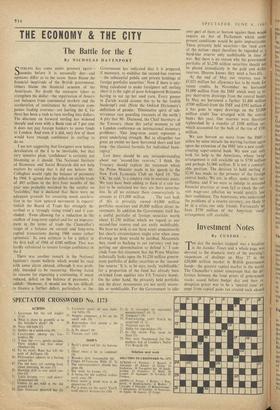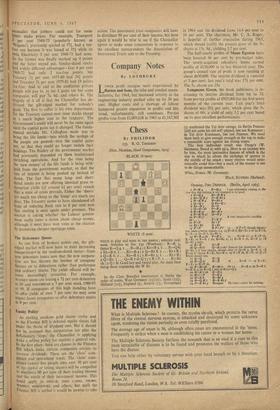Investment Notes
By CUSTOS
TTIHE day the market 'stopped' was a headline in the Sunday Times and a whole page was devoted to the dramatic story of the morning '+ suspension of dealings on May 27 in the £20,000 million market in British government bonds--the greatest capital market in the world. The Chancellor's minor concession that the dif- ference between the issue prices of government stocks issued before budget day and their re- demption prices was to be a 'neutral zone' ex' empt from capital gains tax created such absurd
ell col ne' tio
11.11 an, ,a !at tot lar 'or re- ks. on 00 nil )re et, 81 ild fcr cd of of to t 3, per cent 1968-73 (popularly known as hours make prices. For example, Transport free run because it was issued at 731 while its anomalies that jobbers could not for some twin Electricity 3 per cent 1968-73 had none. So the former was finally marked up 4 points had widely different advantages—Gas 4 per cent Treasury 31 per cent 1977-80 had 24i points companies will pay 7s. 6d. and others 8s. The good. The first to suffer is his own department, and the latter stayed put. Similar-dated stocks and Treasury 31 per cent 1979-81 had 19 points tax-free. And to add to the confusion private tragedy of it all is that the Chancellor has de- stroyed the gilt-edged market for nobody's for the Treasury cannot now issue stocks except mental mistake Mr. Callaghan made was to People will pay 6s. in the £ gains tax but some at a much higher cost to the taxpayer. The Government's credit will never be the same again until the capital gains tax is changed. The funda- 1969-72 had only 2 tax-free points, but Wagons), previously quoted at 774, had a tax- bring the life funds—into which the savings of • -- the people are poured—into the capital gains net, so that they could no longer switch their
lit- holdings. The fluidity of the government market
Ily had previously depended on these institutional
switching operations. And for the time being on the 'new money' of the life funds is being with- rt- held from the government market, so that the at rate of interest is being pushed up instead of
gn down. The fact that many long- and short-
Jr- dated stocks are now offering identical gross re- nd demption yields (of around 61 per cent) reveals .tr- that a state of crisis prevails. Either the 'shorts' are much too cheap or the 'longs' are much too nd dear. The Treasury seems to have abandoned all
to hope of reducing Bank rate to 6 per cent now
we that sterling is once again under pressure. The if; market is asking whether the Labour govern- ment really cares a damn about cheap money. although it must have won votes at the election by promising cheaper mortgage rates.
The Debenture Queue
As one firm of brokers points out, the gilt- edged market will now have to meet increasing competition.—in the medium-dated sector—from new debenture issues now that the new corpora- tion tax has thrown the burden of company 11,nance on to debentures rather than preference and ordinary shares. The yields offered will be- come increasingly attractive. For example, WATNEY MANN are issuing a 71- per cent debenture at 99 and WHITBREAD a 7 per cent stock 1988-93 at 99. If companies of this high standing have to offer yields of over 7 per cent we may soon expect lesser companies to offer debenture stocks at 8 per cent.
Equity Policy
As sterling weakens gold shares revive and as the Finance Bill is debated equity shares fall Under the threat of dividend cuts. But it shoidd not be assumed that corporation tax plus the deflationary 'stops' the Chancellor is applying make a selling policy for equities a general rule. In the first place, there are clauses in the Finance !lilt which make certain companies certain to Increase dividends. These are the 'close' corn- Panics and investment trusts. The 'close' com- panies (where five people own over 50 per cent 01 the capital or voting shares) will be compelled to distribute 60 per cent of their trading income and the whole of their investment income. This Could apply to JAGUAR, JOHN LAING, THORN, W■MPEY, MARCHWIEL and others, but until the Finance Bill is settled it would he unwise to take
action. The investment trust companies will have to distribute 90 per cent of their income, but here again it would be wise to see if the Chancellor agrees to make some concessions in response to the excellent memorandum the Association of Investment Trusts sent to the Treasury.



































 Previous page
Previous page